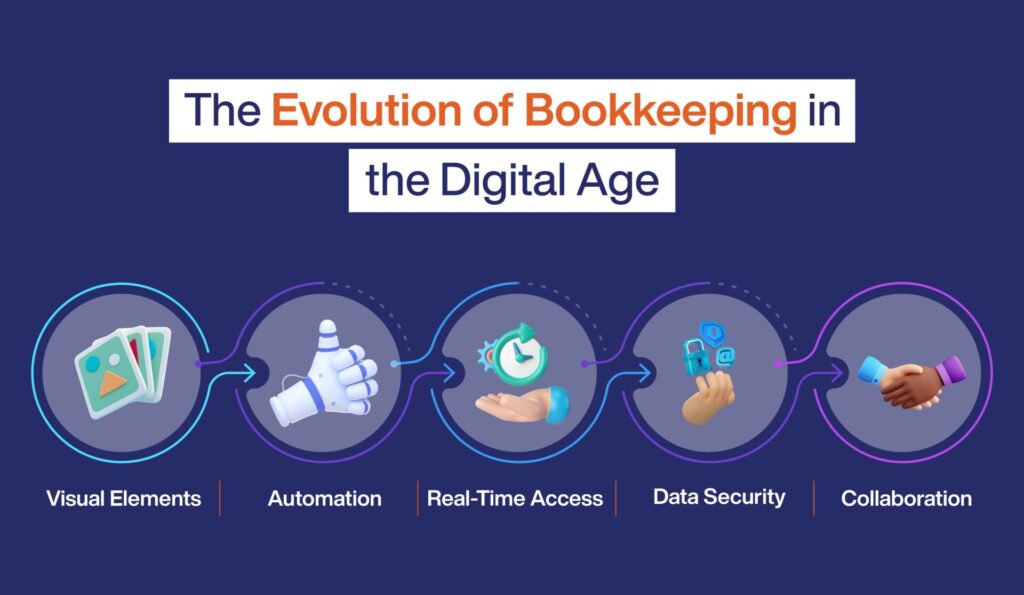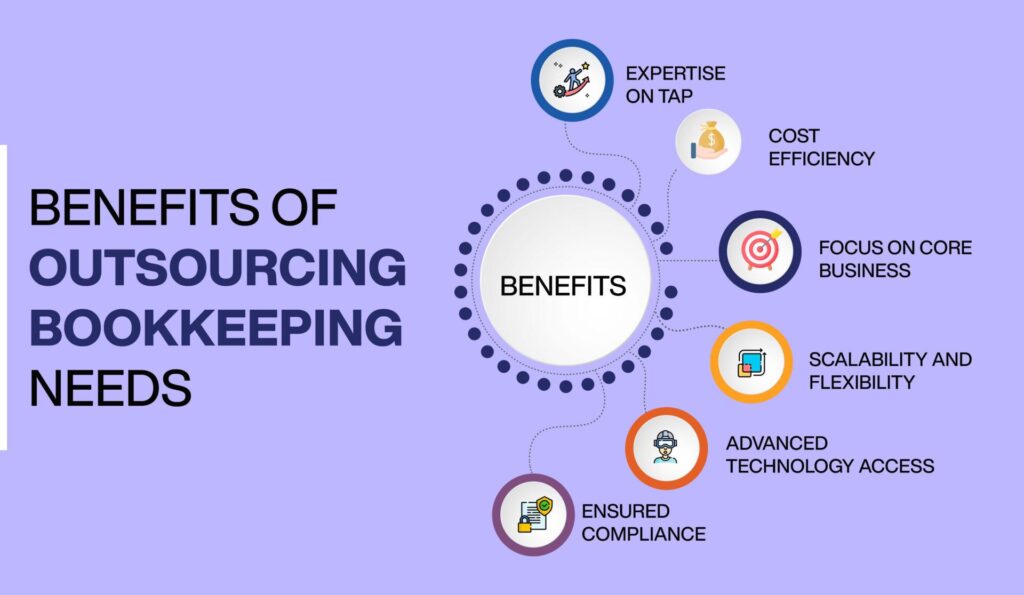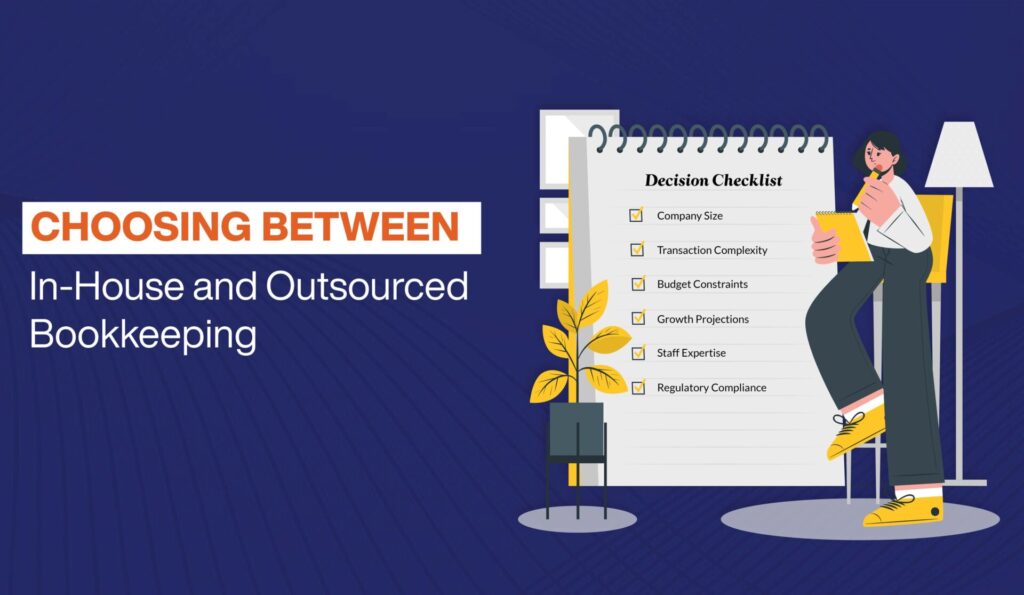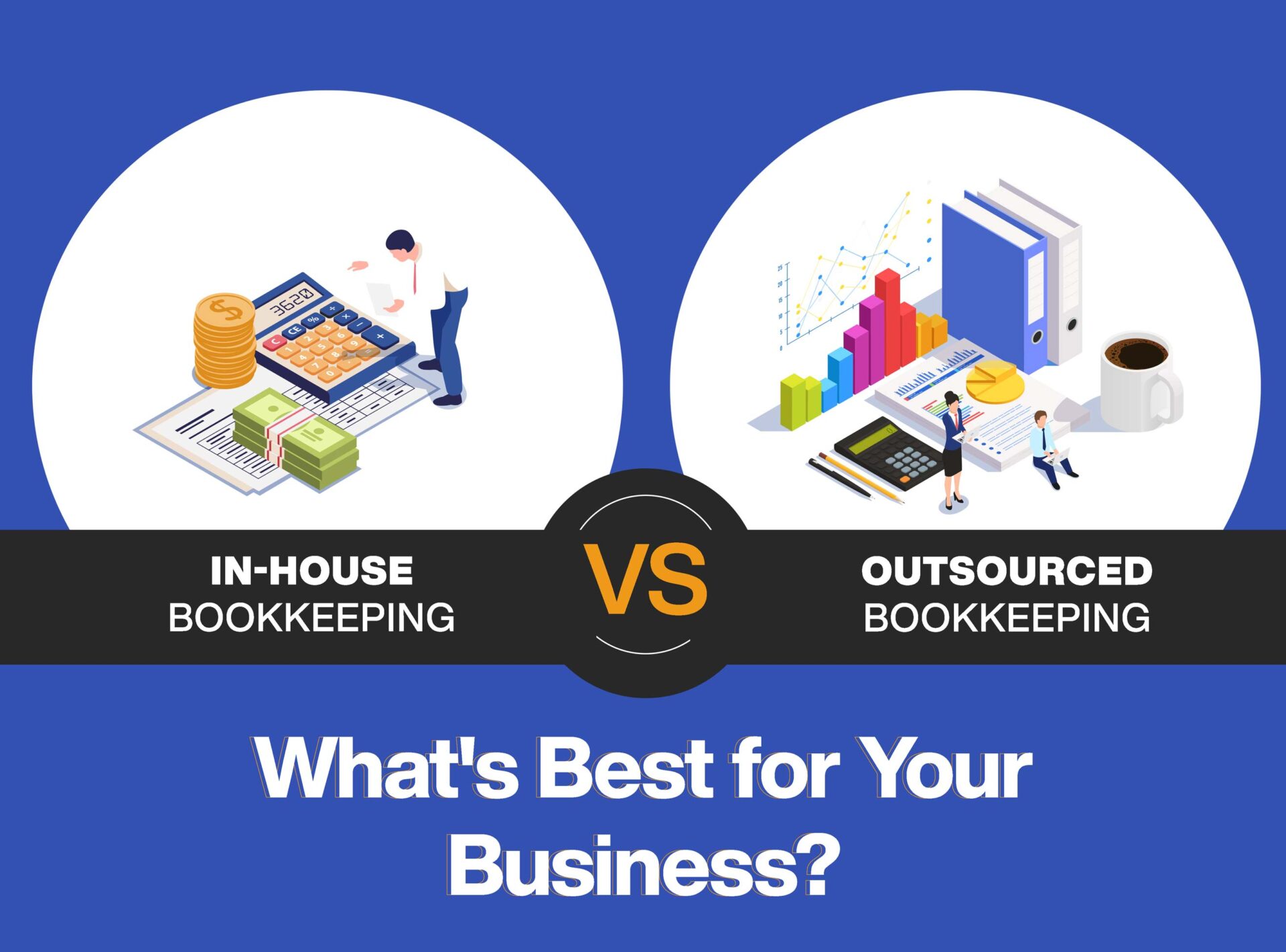In the fast-paced world of business, keeping your financial records in order is like having a trusty map for success. It helps you make smart decisions, stay on the right side of the rules, and boost your profits. But here’s the big question: Should you handle your bookkeeping on your own, right here in your office, or should you team up with an outsourced bookkeeping service?
This blog will break down “In-House vs. Outsourced Bookkeeping” in simple terms, weighing the pros and cons, so you can make the best choice for your unique business needs. Let’s dive in!
Understanding Outsourced Bookkeeping Service in a Modern Business Landscape
In today’s business, outsourcing your bookkeeping is like having a reliable captain to steer your financial ship smoothly. But what’s bookkeeping, and why does it matter in our digital age? Let’s take a closer look.
What is Outsourced Bookkeeping?
Outsourced bookkeeping refers to the practice of hiring external professionals or third-party firms to handle a company’s financial record-keeping and accounting functions. Instead of maintaining an in-house accounting department, businesses opt to outsource their bookkeeping tasks to specialized service providers.
Outsourced bookkeeping services typically include tasks such as:
- Recording Financial Transactions: Outsourced bookkeepers record day-to-day financial transactions, such as sales, purchases, payments, and receipts.
- Bank Reconciliation: They reconcile bank statements with the company’s financial records to ensure accuracy and identify any discrepancies.
- Accounts Payable and Receivable: Managing and recording payments to suppliers (accounts payable) and monitoring incoming payments from customers (accounts receivable).
- Financial Reporting: Preparing financial statements, reports, and summaries to provide insights into the company’s financial performance.
- Tax Preparation Support: Assisting in the preparation of tax-related documents and ensuring compliance with tax regulations.
Whether you’re a small startup or a big corporation, good bookkeeping is essential for:
- Financial Control: Knowing how much money you have and where it’s going helps you stay in the driver’s seat.
- Compliance: Meeting legal requirements and tax obligations becomes a breeze when your financial records are in order.
- Business Growth: Smart financial insights enable you to find opportunities and plan for expansion.
The Evolution of Bookkeeping in the Digital Age

Bookkeeping has come a long way from dusty ledgers and manual calculations. In today’s digital age, it’s gone high-tech:
- Automation: Software and apps now handle repetitive tasks like data entry and calculations, reducing the risk of human error.
- Real-Time Tracking: You can access your financial data anytime, anywhere. No more waiting for monthly reports; it’s at your fingertips.
- Data Security: Digital bookkeeping offers robust security measures to protect your sensitive financial information.
- Collaboration: Cloud-based systems allow multiple team members or an outsourced bookkeeping service to work on your books simultaneously, promoting collaboration and efficiency.
So, the pressing question is – Should you keep this modern bookkeeping adventure in-house, or is outsourcing the way to go? Stick around to find out!
Benefits of Outsourced Bookkeeping

Outsourcing your bookkeeping needs can be a game-changer for your business. It brings a range of advantages that can significantly boost your financial health and overall efficiency. Let’s dive into the key benefits:
- Expertise on Tap:
- Access to Experienced Professionals: When you outsource, you tap into a pool of skilled accountants who are well-versed in the latest accounting standards. This expertise ensures your financial records are always in tip-top shape.
- Assurance of Accuracy and Precision: Professionals leave no room for errors, ensuring your financial data is accurate and precise.
- Cost Efficiency:
- Reduction in Overheads: Say goodbye to the costs associated with hiring, training, and keeping in-house accounting staff. Outsourcing minimizes these overhead expenses.
- Predictable Monthly Costs: With outsourced bookkeeping, you have a clear idea of your monthly expenses, making budgeting a breeze.
- Focus on Core Business Functions:
- Freeing up Internal Resources: Outsourcing your bookkeeping tasks means your internal team can redirect their time and efforts toward core business activities, driving growth and innovation.
- Scalability and Flexibility:
- Easily Scale Up or Down: As your business evolves, so do your accounting needs. Outsourcing offers the flexibility to adjust services based on your current requirements, whether it’s growth or streamlining.
- Access to Advanced Technology:
- Utilizing the Latest Accounting Software: Outsourcing partners often use cutting-edge accounting software and tools, sparing you the expense of in-house investments.
- Ensured Compliance:
- Keeping Up with Changing Regulations: Financial regulations can be a maze, but outsourcing ensures your business stays compliant. Experts constantly monitor and adapt to changing requirements, saving you from compliance headaches.
In a nutshell, an outsourced bookkeeping service empowers your business with specialized expertise, cost savings, and the freedom to concentrate on what you do best. It’s a strategic move that can drive efficiency and growth while ensuring your financial records remain accurate and compliant.
In-house Bookkeeping: A Quick Overview
When it comes to managing your financial records, some businesses prefer to keep bookkeeping tasks in-house. This approach has its own set of advantages and challenges. Let’s take a closer look:
Benefits of Keeping Bookkeeping In-House:
- Immediate Control: When you handle bookkeeping internally, you have real-time oversight and control over your financial data. This enables quick decision-making and a deep understanding of your financial health.
- Company-Specific Knowledge: In-house teams are intimately familiar with your business’s unique nuances, ensuring that financial records accurately reflect your operations.
- Cost Savings: While outsourcing may have upfront savings, in-house bookkeeping can become cost-effective over time, especially for small businesses with relatively simple financial transactions.
- Data Security: You have direct control over your financial data security protocols, potentially reducing the risk of data breaches.
- Flexible Processes: In-house bookkeeping allows you to tailor processes to your exact needs and adapt quickly to changes in your business environment.
Challenges Faced by Businesses Managing Their Own Financial Records:
- Resource Intensity: Managing bookkeeping internally can be time-consuming and may divert resources away from core business activities.
- Expertise Requirement: Maintaining accurate financial records demands a certain level of expertise. Without skilled staff, errors can occur, potentially leading to financial mismanagement or compliance issues.
- Limited Scalability: In-house teams may struggle to keep up with the demands of a growing business, especially during periods of rapid expansion.
- Technology Costs: Investing in and supporting accounting software and hardware can be expensive. Staying up to date with the latest technology can be challenging and costly.
- Risk of Burnout: Overloading existing staff with bookkeeping responsibilities can lead to burnout and reduced productivity.
In summary, keeping bookkeeping tasks in-house offers control, company-specific knowledge, potential cost savings, and data security advantages. However, it also poses challenges related to resource intensity, expertise requirements, scalability limitations, technology costs, and the risk of staff burnout. Deciding between in-house vs. outsourced bookkeeping depends on your business’s unique needs and priorities.
Considerations Before Deciding on In-House vs. Outsourced Bookkeeping

Choosing between in-house and outsourced bookkeeping is a critical decision for any business. To make an informed choice, take these key factors into consideration:
- Company Size and Scale:
Feasibility and Advantage: Evaluate whether your business is at a scale where in-house bookkeeping is possible and whether it provides a strategic advantage. Smaller businesses might find it more manageable to keep bookkeeping in-house, while larger enterprises may benefit from outsourcing.
- Financial Complexity:
Intricacy of Transactions: Consider the complexity of your financial transactions and record-keeping tasks. If your finances involve numerous intricate transactions, outsourcing may ensure accuracy and compliance.
- Budget:
Cost Comparison: Compare the costs of hiring and supporting an in-house bookkeeping team with the expenses associated with outsourcing. Factor in salaries, benefits, software, hardware, and ongoing training costs.
- Future Growth Plans:
Scalability: Think about your business’s growth trajectory. If you predict significant growth, consider whether your in-house team can manage increased bookkeeping demands or if outsourcing offers more flexibility.
- Internal Expertise:
Knowledge Level: Assess the current ability and experience of your in-house staff. If they lack the necessary accounting skills, training might be needed, or outsourcing could be a better choice.
- Compliance and Regulation:
Industry-Specific Requirements: Industries with stringent compliance and regulatory demands may find it more efficient to outsource to experts who are well-versed in these regulations.
- Time Allocation:
Resource Allocation: Figure out how much time your team can realistically allocate to bookkeeping tasks without compromising their effectiveness in core business activities.
- Data Security Concerns:
Risk Assessment: Weigh the security concerns associated with sharing sensitive financial data with an external partner against the control and security measures you can implement in-house.
- Technology Readiness:
Access to Technology: Consider your access to and readiness for the latest accounting software and technology, which can significantly impact the efficiency of your bookkeeping processes.
- Quality and Accuracy:
Desired Level of Precision: Assess the level of accuracy and precision required for your financial records. outsourced bookkeeping service may provide access to experts who excel in this aspect.
By carefully examining these factors and aligning them with your business’s specific needs and goals, you can make a well-informed decision on “In-House vs. Outsourced Bookkeeping.” It’s a choice that determines whether to retain bookkeeping in-house or opt for outsourcing — a decision that can significantly influence your financial management and overall business success.
Finding the Right Balance: Hybrid Models
In the world of bookkeeping, one size doesn’t fit all. While some businesses thrive with in-house teams, and others find outsourcing the perfect solution, there’s a middle ground worth exploring – the hybrid model. This approach allows businesses to retain control over critical functions while outsourcing others. Let’s delve into the concept and explore a case study of a business successfully leveraging a hybrid model.
Exploring Hybrid Models
A hybrid bookkeeping model involves strategically blending in-house and outsourced bookkeeping functions. This approach offers flexibility, allowing businesses to play to their strengths while mitigating weaknesses. Here’s how it typically works:
- Core Functions In-House: Businesses retain control over core bookkeeping tasks that require a deep understanding of their operations. This includes managing day-to-day financial transactions, internal reporting, and budgeting.
- Outsourced Functions: Non-core or specialized tasks are outsourced to experts. This may include complex financial analysis, tax preparation, compliance reporting, or payroll processing.
Conclusion for In-House vs. Outsourced Bookkeeping
The choice between in-house vs. outsourced bookkeeping is not one-size-fits-all. Every business is unique, and the decision should be tailored to your specific needs and circumstances. Here are the key take aways for you:
- Tailored Decision: The choice to outsource bookkeeping should be tailored to your business’s unique needs and circumstances.
- Assess Carefully: Before deciding, assess factors such as company size, financial complexity, budget, growth plans, and internal expertise.
- Risks vs. Benefits: Weigh the risks and benefits of both in-house and outsourced bookkeeping options to make an informed decision.
- Hybrid Models: Consider hybrid models that combine in-house and outsourced functions for a flexible and efficient approach to bookkeeping.
- Consult Experts: Don’t hesitate to seek expert advice and personalized assessments from accounting service professionals to make the best choice for your business.
If you enjoyed reading this article, be sure to explore our other blogs on Accounting, Bookkeeping, and Outsourcing!
Take a close look at your current bookkeeping practices. Are they meeting your needs efficiently and accurately? Reach out to us for a personalized assessment of your bookkeeping requirements. We can help you determine the best path forward to ensure financial success for your unique business.
